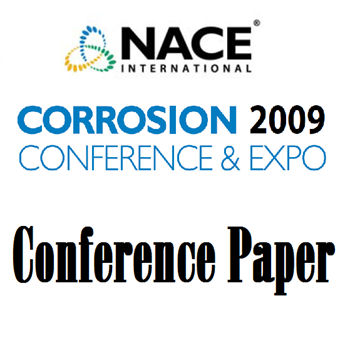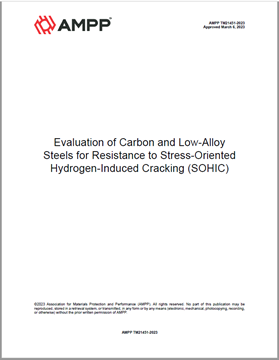
Available for download
Product Number:
51300-09364-SG
ISBN:
09364 2009 CP
Author:
Stale Nodland, Philip Dent and Kamran Fatehi
Publication Date:
2009
$20.00
We're sorry, something went wrong.
We are unable to complete this action. Please try again at a later time.
If this error continues to occur, please contact AMPP Customer Support for assistance.
Error Message:
Please login to use Standards Credits*
* AMPP Members receive Standards Credits in order to redeem eligible Standards and Reports in the Store
You are not a Member.
AMPP Members enjoy many benefits, including Standards Credits which can be used to redeem eligible Standards and Reports in the Store.
You can visit the Membership Page to learn about the benefits of membership.
You have previously purchased this item.
Go to Downloadable Products in your AMPP Store profile to find this item.
You do not have sufficient Standards Credits to claim this item.
Click on 'ADD TO CART' to purchase this item.
Please review your transaction.
Click on 'REDEEM' to use your Standards Credits to claim this item.
You have successfully redeemed:
Go to Downloadable Products in your AMPP Store Profile to find and download this item.

Available for download
Product Number:
AMPP TM21451-2023
Publication Date:
2023
$109.00
We're sorry, something went wrong.
We are unable to complete this action. Please try again at a later time.
If this error continues to occur, please contact AMPP Customer Support for assistance.
Error Message:
Please login to use Standards Credits*
* AMPP Members receive Standards Credits in order to redeem eligible Standards and Reports in the Store
You are not a Member.
AMPP Members enjoy many benefits, including Standards Credits which can be used to redeem eligible Standards and Reports in the Store.
You can visit the Membership Page to learn about the benefits of membership.
You have previously purchased this item.
Go to Downloadable Products in your AMPP Store profile to find this item.
You do not have sufficient Standards Credits to claim this item.
Click on 'ADD TO CART' to purchase this item.
Please review your transaction.
Click on 'REDEEM' to use your Standards Credits to claim this item.
You have successfully redeemed:
Go to Downloadable Products in your AMPP Store Profile to find and download this item.

Available for download
Product Number:
51320-14446-SG
Author:
Xin Yue, Weiji Huang, Andrew J. Wasson, Jamey A. Fenske, Timothy D. Anderson, Brian D. Newbury, Doug P. Fairchild
Publication Date:
2020
$20.00
Steel pipelines are sometimes subjected to demanding sour environments resulting from the presence of high H2S contents. Pipeline materials, therefore, must be resilient against sulfide stress cracking (SSC) which is caused by H2S. Beginning in the 1980s, thermo-mechanically controlled processed (TMCP) steels have been widely used for the manufacturing of large-diameter sour service pipelines. The failure of the Kashagan pipelines in 2013 raised concern regarding the use of TMCP steels in sour environments. These concerns arise from the potential for local hard zones (LHZs) to be produced on the surface of the line pipe during TMCP processes, ultimately leading to through-wall SSC failures. In the present study, several X60 - X65 TMCP steels (both with and without LHZs) have been tested under different Region 3 (R3) conditions in the NACE MR0175/ISO15156-2 pH-H2S partial pressure diagram. It can be concluded that the presence of LHZs increases TMCP steels’ sour cracking susceptibility; however, TMCP steels without LHZs pass the SSC tests at even the most severe R3 environments. Traditional HRC or HV10 testing are not able to detect LHZs, and so lower load HV 0.5 or HV 0.1 tests are necessary. For TMCP steels, the current R3 may be further divided into R3-a and R3-b sub-regions. The sour cracking severity of R3-a is less than that of R3-b. Additional actions, like enhanced mill qualification of the TMCP plate, should be considered to ensure that no LHZs exist in steels to be utilized in R3-b environments.
We're sorry, something went wrong.
We are unable to complete this action. Please try again at a later time.
If this error continues to occur, please contact AMPP Customer Support for assistance.
Error Message:
Please login to use Standards Credits*
* AMPP Members receive Standards Credits in order to redeem eligible Standards and Reports in the Store
You are not a Member.
AMPP Members enjoy many benefits, including Standards Credits which can be used to redeem eligible Standards and Reports in the Store.
You can visit the Membership Page to learn about the benefits of membership.
You have previously purchased this item.
Go to Downloadable Products in your AMPP Store profile to find this item.
You do not have sufficient Standards Credits to claim this item.
Click on 'ADD TO CART' to purchase this item.
Please review your transaction.
Click on 'REDEEM' to use your Standards Credits to claim this item.
You have successfully redeemed:
Go to Downloadable Products in your AMPP Store Profile to find and download this item.

Available for download
Product Number:
51321-16571-SG
Author:
Thomas Haase / Christoph Kalwa/ Christoph Bosch
Publication Date:
2021
$20.00
We're sorry, something went wrong.
We are unable to complete this action. Please try again at a later time.
If this error continues to occur, please contact AMPP Customer Support for assistance.
Error Message:
Please login to use Standards Credits*
* AMPP Members receive Standards Credits in order to redeem eligible Standards and Reports in the Store
You are not a Member.
AMPP Members enjoy many benefits, including Standards Credits which can be used to redeem eligible Standards and Reports in the Store.
You can visit the Membership Page to learn about the benefits of membership.
You have previously purchased this item.
Go to Downloadable Products in your AMPP Store profile to find this item.
You do not have sufficient Standards Credits to claim this item.
Click on 'ADD TO CART' to purchase this item.
Please review your transaction.
Click on 'REDEEM' to use your Standards Credits to claim this item.
You have successfully redeemed:
Go to Downloadable Products in your AMPP Store Profile to find and download this item.




